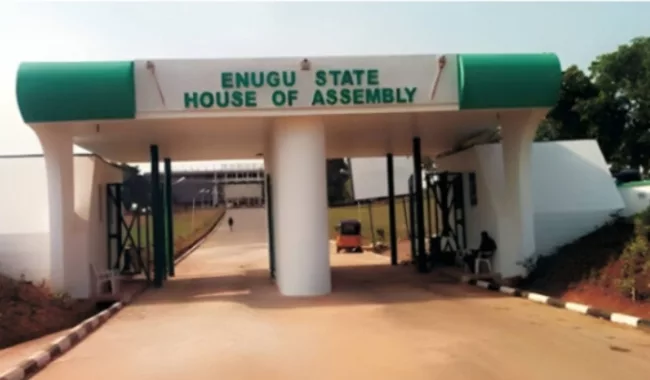Why Labour Party Cannot Lead Enugu Assembly Despite Being Majority
The Labour Party (LP) members-elect in Enugu State cannot produce the speaker and deputy speaker for the yet-to-be-inaugurated 8th Enugu House of Assembly, despite being the majority in the assembly.
The LP caused a surprising upset during the 2023 general elections across the country mainly in the South-east, after winning the governorship election in Abia State and securing several seats in both state and federal legislative houses in the country.
In Enugu, the party won two of the three Senate seats and also won seven of the eight House of Representatives seats.
It won 14 of the 24 Enugu Assembly seats to become the majority party in the yet-to-be-inaugurated 8th House, unseating the ruling Peoples Democratic Party (PDP), which had been the only party in previous houses.
The PDP won only 10 seats in the assembly and would be in the minority for the first time in the state since the return of democracy in 1999.
Before the 2023 LP upset, the PDP had been in firm control of Enugu State and had won all elections in the state.
The LP also won the presidential election in each of the five South-east states.
The successes recorded by the LP across the South-east and other parts of Nigeria were attributed to the “effect” of Peter Obi, the 2023 LP presidential candidate, who enjoyed swelling support across the country during the elections.
The current 7th assembly of Enugu State was inaugurated on 10 June 2019. The assembly’s lifespan will end by Saturday, 10 June 2023, having stayed four years since its inauguration, according to Section 105(1) of the 1999 Constitution as amended.
“A house of assembly shall stand dissolved at the expiration of a period of four years commencing from the date of the first sitting of the House,” the sub-section reads.
Earlier this month, there were speculations that the PDP leadership in the state and the state governor, Peter Mbah, were plotting to inaugurate the assembly secretly to prevent members-elect of the LP, who are in the majority, from producing the speaker and deputy speaker of the House.
The Clerk of the State House of Assembly, Emma Udaya, however, debunked the speculations.
According to reports, despite being the majority in the Enugu State House of Assembly, members-elect of the LP cannot produce leaders of the House.
This is because the 14 members-elect of the LP are fresh members.
According to the Standing Orders of the Enugu Assembly, to become the speaker or the deputy speaker, the candidates must be ranking members of the assembly.
“Any member nominated as speaker or deputy shall be a ranking member who must have successfully completed a four-year tenure in a state House of Assembly,” part of the Standing Orders reads.
The implication of the order is that, although a party with a majority in the House can garner more votes during elections for the speaker and deputy speaker, such a party must overcome the first hurdle of having ranking members among them for the positions.
The clerk is mandated to preside over an inaugural session of the House and the election of the speaker as well as deputy speaker of the House, according to the order.
The order, therefore, puts the ruling PDP in a position to retake the leadership when the 8th Assembly is inaugurated, despite being in the minority.
But among the 10 members-elect of the PDP, only four of them are ranking members and are qualified to be nominated for the principal leadership positions in the House, checks by this newspaper showed.
The four members are Callistus Uche Ugwu (Udi North Constituency), Ezenta Ezeani (Igbo-Etiti East Constituency), Iloabuchi Aniagu (Nkanu West Constituency), and Jane Chinwe Eneh (Awgu North Constituency).
They served as lawmakers in the 7th assembly and were reelected during the 18 March general elections in the state.
Order can’t be changed before inauguration
Before now, Sections 54, 96, 105 and 311 of Nigeria’s Constitution 1999 did not adequately provide regulations on procedures of the first session and inauguration of members-elect of the country’s legislative houses, particularly the State Houses of Assembly.
However, the National Assembly, in 2023, enacted an Act which altered the provisions of the sections to adequately regulate the first session and inauguration of members-elect of both the National and State Houses of Assembly.
With respect to the State Houses of Assembly, the altered provision of Section 105 (4) of the constitution, insists that the standing orders of a state house of assembly before its dissolution must apply in the first session of a new assembly.
“The standing orders of the house of assembly before its dissolution under section 105 of the constitution shall apply in relation to the proceedings of the first session of the state house of assembly convened by the governor pursuant to his powers under this constitution,” the section read.
The implication of this constitutional provision is that the lawmakers-elect cannot change the standing orders of the departing 7th assembly of Enugu State.
Subsection five of the altered section (105) highlighted the period within which the standing orders may be changed.
“The standing orders of a legislative house before its dissolution under section 64 or 105 of this constitution may be modified within such a reasonable time after the inauguration and first session with the proceedings of the newly inaugurated legislative house,” the section states

COMMENTS